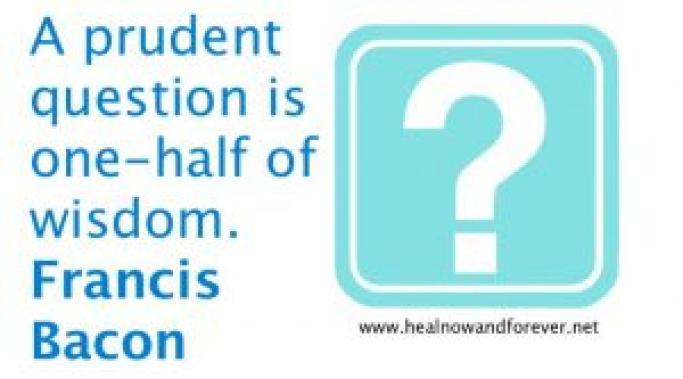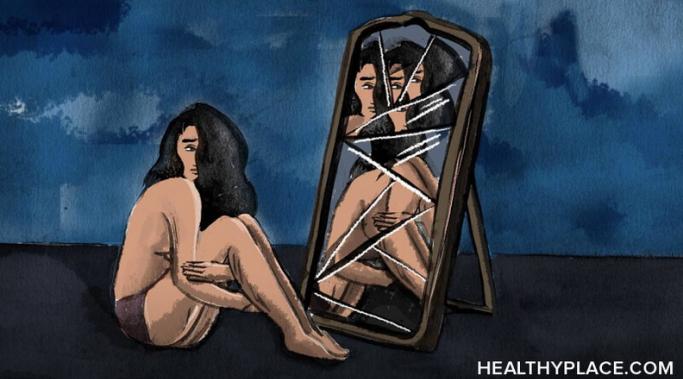Blogs
What are you avoiding? What is keeping you from achieving your goals? Chances are you are making excuses due to a fear of rejection or the pattern of negative thinking pattern that contributes to low self-esteem and confidence. HealthyPlace Blogger Emily Roberts shows you how-to stop this cycle in this short video.
Sometimes asking questions is a powerful way to move energy. Here are some questions for anxiety. Ask them and see what happens.
Please Ask Anxiety These Questions
What do you want from me?
Why do you want to ruin my life?
Why do you tell me that you are more powerful than me?
Why do you make me feel like I'll have to deal with you forever?
I’ve never been a huge fan of running or lifting or going to a gym. For me, it takes a lot, and I mean a lot, of motivation to get my butt out of bed to work out for an hour. My family, on the other hand, almost obsesses with working out. Half of my relatives are P.E. teachers or Physical Therapists and have raced in half or full marathons. Many are now into CrossFit, which scares the living crap out of me.
During high school, when I was struggling with self-harm, I was a serious dancer. I went to a strict ballet school, which kept me busy almost every night of the week. It was good, staying fit and pushing my focus onto something else. However, when dancing I could not wear bracelets and no matter how much make-up I put on my scars, the sweat would eat it away.
Then, questions would be asked and lies would be spit out.
A grounding technique is any structured practice that refocuses the mind, so that some unpleasant feeling can be reduced or eliminated and one's sense of what's real can improve. Such practices, usually acquired rather than spontaneously emerging when needed, have great value for anyone challenged with unresolved trauma memories. Fortunately, grounding techniques have value for those without unresolved trauma memories, as well.
tneely
It was the summer of 2010 and after 4 years of coming out, dating and gradually growing closer as a couple, my partner Tamiko and I were both joyously and anxiously planning for our upcoming commitment ceremony that autumn. We were also looking forward to blending our families and starting a new chapter of life together.
Addiction, whether it's to a substance such as alcohol or a behavior such as casual sex, is cunning, baffling, and powerful--and a common trait of borderline personality disorder (BPD). We need help to fight it. But some of the addiction battle is up to us. One important way to fight addiction is by replacing your addiction with a positive hobby. In my case, I have replaced my alcoholic lifestyle with the production and consumption of kombucha.
All survivors have their war stories and I am no exception. In my case, the battlefield was my body and the enemy was the bully in my head, the mean girl who told me over the years I was unpretty, boring, fat, lazy and not smart. My eating disorder wasn’t a phase. It was a disease born in the corners of my mind that caused me to cycle through endless episodes of bingeing, purging and starvation.
When bipolar disorder's irrational thoughts occur, how does one even begin to make friends? In public, I feel as if everyone is watching me and talking about me, or making internal judgments. I'm acutely aware of every person in the vicinity; watching their movements, noticing any eye contact, listening for whispers. Cognitively, I know that this is irrational (Co-Occurring Bipolar and Anxiety Disorders). I know that I am not the center of everyone's attention, that there is nothing wrong with my physical appearance and actions. In all reality, the majority of those people haven't even given me a second thought. But when you experience bipolar disorder's irrational thoughts, it can be difficult to make friends.
Recently, I spent the afternoon making greeting cards. I’m not particularly crafty, but this is a hobby my mom got me into years ago and I enjoy the creativity of making up my own designs combined with the practicality of creating something I need anyway. I have a little spot in the basement where I have all my paper and ink and stamps and glue and I spent four glorious hours all by myself figuring out the design for this year’s family holiday card. And I felt guilty nearly the entire time.
Even amongst people with bipolar disorder, the disorder is highly contested. People argue about what it’s “really” like to have bipolar disorder. What mania is like. What depression is like. And perhaps most hotly debated of all is what the appropriate treatment of the symptoms is – antipsychotics, mood stabilizers, antidepressants, psychotherapies, alternative treatments and so on. People argue about virtually everything.
And one of the reasons why this is the case is because the experience of bipolar disorder is so vastly different. Some people experience manic psychosis, others do not. Some people experience delusional depression, others do not. Some people experience suicidality, others do not. And so on. Severity varies as do symptoms.
And I would argue that much of this disagreement stems from the two basic types of bipolar disorder: well-controlled and not well-controlled bipolar disorder.







![MC900441394[1]](/sites/default/files/styles/blog_listing/public/uploads/2013/08/MC9004413941.png?itok=UHwwmyXi)